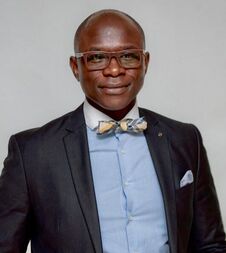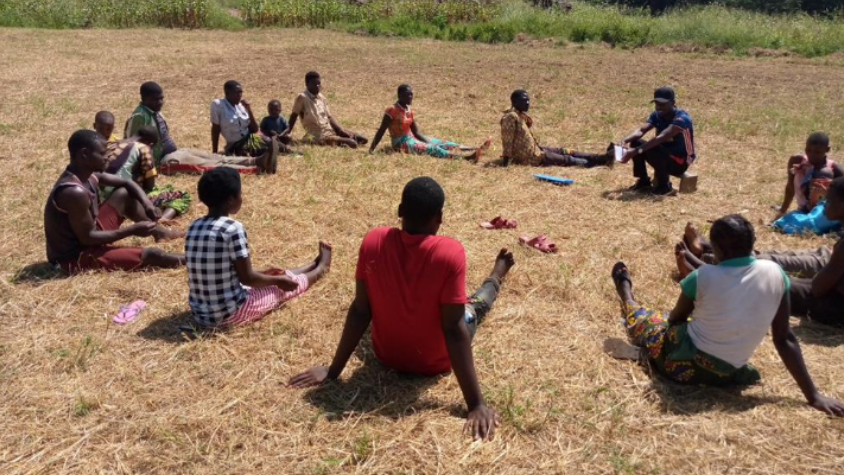Movement Matters #2
The Movement for Community-led Development is starting a monthly column to share human interest stories that illustrate breakthroughs and learning moments across our membership. In the second edition of the Movement for Community-led Development’s monthly column, Movement Matters, Arthur Nkosi (Director, CorpsAfrica Malawi) unpacks the links between CorpsAfrica and MCLD’s values and shares learnings from experiences in a leadership role at MCLD’s Malawi Chapter.
SB: What is CorpsAfrica’s creation story and how did that evolve?
AN: CorpsAfrica is a non-profit organization that recruits and places ambitious young Africans in remote, high-poverty communities in their own countries to facilitate small-scale, high-impact projects that are identified by local people, fulfill key needs, and whose impact and success can be carefully measured, all through a transformative volunteer experience. Liz Fanning the Founder and Executive Director said, “When I was a Peace Corps Volunteer in Morocco, amazing young Moroccans used to ask me if they could do what I was doing – they’d say, ‘I’m Moroccan, I want to help my country, can I be a Peace Corps Volunteer?’ and I had to say, ‘Sorry, it’s only for Americans.’ I started CorpsAfrica so they could have the same opportunity I did to learn, grow, and make an impact.” This compelled Liz to drive the initiative which has brought CorpsAfrica to where it is now, with operations in Morocco, Senegal, Rwanda, Ghana, Kenya, and Malawi.
SB: What are the core values of CorpsAfrica and how do they align with the ideas of community-led development?
AN: Everything CorpsAfrica does is about community-led development, with the following principles:
Locals Helping Locals: We believe that qualified Africans can be part of the solution for their own countries. The Volunteers relocate to remote communities in their own countries for one year and fully integrate by learning local customs, participating in day-to-day activities, and becoming trusted members of the community.
Listening and Empowering: We stress the importance and power of listening. Volunteers lead change by engaging people in conversations and facilitating community meetings to identify and address changing and complex local needs. We believe that development efforts are most effective when they are “demand-driven” – giving women, men, and youth at the community level the opportunity to identify problems and take the lead to solve them.
Collaboration: Volunteers serve as liaisons between their communities and the outside world. CorpsAfrica is uniquely positioned to collaborate with a wide range of Development Partners. These Development Partners include NGOs, development-related businesses, government officials, academics, and social entrepreneurs who share their expertise and assist the volunteers with project implementation.
Monitoring and Evaluation: We think that no effort is complete without thorough monitoring and evaluation. Before beginning their service, Volunteers are taught how to facilitate a needs assessment in local communities. After their service, Volunteers measure the projects’ impact on the community or targeted population. Furthermore, CorpsAfrica measures the impact on the lives of the Volunteers who complete the program and have gained valuable grassroots community development experience.
Accountability and Transparency: We strive to demonstrate our successes as well as our errors to Development Partners, targeted communities, and all interested outside parties so we can be held accountable for everything we do. It keeps us motivated and encourages us to be the best that we can be.
SB: What compelled CorpsAfrica to join the Movement?
AN: CorpsAfrica joined the Movement because we believe in the vision of the Movement for Community-Led Development, which is creating an environment where communities can be heard and supported by donors and supports in all sectors.
SB: How have you been involved in the Movement, and what have you learned from working with the Movement?
AN: I have been the Chairperson for the MCLD Chapter in Malawi for the last 2 years.
I have learned that collaboration is key in the work we do, we all need each other to support the Movement, there are many players in the world who are doing similar activities in their own right and there is a lot we can learn through methodologies used and linkages created.
One of the greatest challenges of being the chairperson is keeping chapter members engaged. Especially during the pandemic when members refocused on the agendas of their own organizations, chapter projects slowed down. I took over chairmanship when COVID was at its peak and had to find ways to draw members back in.
The COVID radio show is the highlight of what our chapter has accomplished. We realized that we needed to take action against the misinformation that was growing about the COVID vaccines. We organized community radio call-ins and TV shows carried by the national broadcaster in the local language to link people to the experts. Read more about the radio show here.
SB: Has the Movement changed your understanding of community-led development?
AN: It has not only changed my understanding but has also strengthened my belief that there is power in collaboration and empowering communities to do what they are capable of.
SB: What about the Movement resonates for you and for CorpsAfrica?
AN: What resonates with me and CorpsAfrica about the Movement is that it brings those who are in development work closer together which provides larger opportunities for networking. For example, through the Movement, we have been able to work on building an MCLD toolkit, which enables communities to hold organizations accountable for the work done in communities.
SB: Could you tell me about a time that CorpsAfrica used community-led development in practice? Perhaps an example of mobilizing for change in a community?
AN: The best way to explain this would be to provide this link, which shows how a Volunteer was able to build an under-five clinic in a community, led by the community, to sustain the vaccinations of children under five years old.
What stands out for me in Dorothy’s story is that this is a community where the Malawi government had built a hospital (specifically, an under-5 clinic) back in the late ‘80s. Since it was not a priority area, it was a shell of a building; the project just stopped. Dorothy was there for one year, and within the first 3-6 months, she raised questions as to what the community felt the most important focus areas were.
The first thing the community wanted to improve was the health of their children through the re-establishment of an under-5 clinic. Dorothy invested in the community’s goal – and as a result, community members no longer must walk 20-30 kilometers to get vaccinations, weigh their children, or even give birth. Now you have a population of 300 households that do not have to go very far to access health facilities anymore.
SB: What is one piece of advice or guidance you would give an organization starting their journey to intentionally shift power?
AN: My only advice is to enable, enable and enable. Learn from what others are doing in their field, share knowledge and empower the communities you serve.



Featured Photo Credit: CorpsAfrica

Arthur Nkosi serves as Director of CorpsAfrica/Malawi. He has worked within the service industry for Fortune 500 companies in the United States and has over twelve years of banking experience in micro-finance. As the Chief Human Resources Officer at Opportunity International Bank of Malawi, where he managed a workforce of more than 600 employees, his focus was on staff development and organizational behavior. Since that position, Arthur has worked as the Client Portfolio Director with Non-Government Organizations and Government entities in Malawi to build sustainable communities through financial services. Arthur has a BA in Marketing and Business Administration from the University of Indianapolis (US) and an MA in Leadership and Change Management from Leeds Beckett University (UK).


